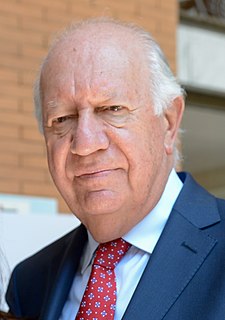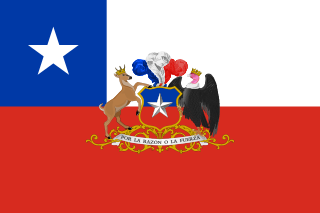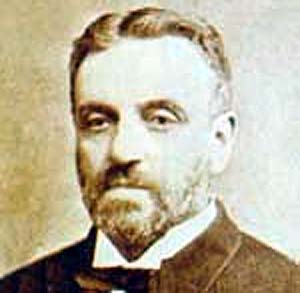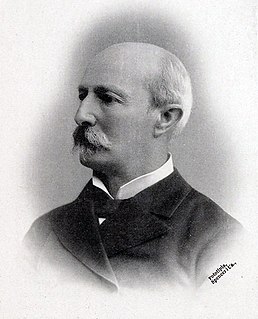The 1891 Chilean presidential election may refer to:
The 1891 Chilean presidential election may refer to:

Chile's government is a representative democratic republic, whereby the President of Chile is both head of state and head of government, and of a formal multi-party system. Executive power is exercised by the president and by his or her cabinet. Legislative power is vested in both the government and the two chambers of the National Congress. The judiciary is independent of the executive and the legislature of Chile.

The Party for Democracy is a centre-left political party in Chile. It states to stand in the traditions of liberal progressivism. It was founded in December 1987 by Ricardo Lagos, who aimed at forming a legal social-democratic party, as the Socialist Party of Chile (PS) remained illegal at the time. The PPD continued to function after the defeat of Pinochet. Until 1997, double membership of PPD and the PS was allowed.

The Socialist Party of Chile is a centre-left political party. Its historic leader was President of Chile Salvador Allende, who was deposed in a coup d'état by General Augusto Pinochet in 1973. Twenty-seven years later, Ricardo Lagos Escobar represented the Socialist Party in the 1999–2000 Chilean presidential election. He won 48.0% in the first round of voting and was elected with 51.3% in the second round. In the 2001 Chilean parliamentary election, as part of the Coalition of Parties for Democracy, the party won 10 out of 117 seats in the Chamber of Deputies of Chile and 5 out of 38 elected seats in the Senate. After the 2005 Chilean parliamentary election, the party increased its seats to 15 and 8, respectively. In the 2009 Chilean parliamentary election, it retained 11 Congressional and 5 Senate seats.

Jorge Montt Álvarez was a vice admiral in the Chilean Navy and president of Chile from 1891 to 1896.

Chile holds nationwide presidential, parliamentary, regional and municipal elections.

The Chilean presidential election of 1891 took place through a system of electors, and resulted in the election as President of Jorge Montt, who was the sole candidate.

Ricardo Froilán Lagos Escobar is a Chilean lawyer, economist and social-democratic politician who served as President of Chile from 2000 to 2006. During the 1980s he was well-known for his opposition to the Chilean military dictatorship, and astounded contemporaries by calling out dictator Augusto Pinochet on live TV. He won the 1999-2000 presidential election by a narrow margin in a runoff over Independent Democrat Union (UDI) candidate Joaquín Lavín. Lagos was the third president from the center-left Coalition of Parties for Democracy to have ruled Chile since 1990. He was succeeded on March 11, 2006 by Socialist Michelle Bachelet, from the same coalition. From 2007 to 2010 he served as a Special Envoy on Climate Change for the United Nations Secretary-General Ban Ki-moon. Lagos made an unsuccessful bid to run for president in the 2017 Chilean general election.
Abraham Oyanedel Urrutia was Acting President of Chile in 1932.
The 1952 presidential election may refer to:
1964 presidential election may refer to:
The Liberal Party of Chile was a Chilean political party created by a faction of pipiolos in 1849. After the conservative victory in the Chilean Civil War of 1829 the liberals became the principal opposition party to the Conservative Party. During the Liberal Party's early history one of its main goal was to create a new constitution to replace the Chilean Constitution of 1833. Rigged election helped to prevent the Liberal Party's presidential candidates to be elected until 1861, during that time elements of the liberal party made attempts to overthrow the government, these were the Revolution of 1851 and the Revolution of 1859. These failed insurrections led many liberals to emigrate, among them Benjamín Vicuña Mackenna. In 1863 a group of liberal split off to form the Radical Party which would hold power from 1938 to 1952. Originally an anticlericalist party that championed classical liberalism, the liberals later became a right-wing party.

The Parliamentary Era in Chile began in 1891, at the end of the Civil War, and spanned until 1925 and the establishment of the 1925 Constitution. Also called "pseudo-parliamentary" period or "Parliamentary Republic", this period was thus named because it established a quasi-parliamentary system based on the interpretation of the 1833 Constitution following the defeat of President José Manuel Balmaceda during the Civil War. As opposed to a "true parliamentary" system, the executive was not subject to the legislative power but checks and balances of executive over the legislature were weakened. The President remained the head of state but its powers and control of the government were reduced. The Parliamentary Republic lasted until the 1925 Constitution drafted by President Arturo Alessandri and his minister José Maza. The new Constitution created a presidential system, which lasted, with several modifications, until the 1973 coup d'état.

The president of Chile, officially known as the President of the Republic of Chile is the head of state and head of government of Chile. The president is responsible for both the Chilean government and state administration. Although its role and significance has changed over the history of Chile, as well as its position and relations with other actors in the national political organization, it is one of the most prominent political figures. It is also considered one of the institutions that make up the "Historic Constitution of Chile", and is essential to the country's political stability.

Pedro Vicente Reyes Palazuelos, was a Chilean lawyer, journalist, political figure, and candidate during the 1896 presidential election.
The 1932 presidential election may refer to:
1920 presidential election may refer to:
The Progressive Party is a political party in Chile. It was founded in 2010 by former Socialist deputy and presidential candidate Marco Enriquez-Ominami. It is the political successor of the coalition New Majority for Chile.
The following lists events that happened during 1886 in Chile.

Indirect presidential elections were held in Chile on 22 July 1891. Claudio Vicuña Guerrero, a member of the Liberal Party, was elected president. However, he never took office and subsequently went into exile.